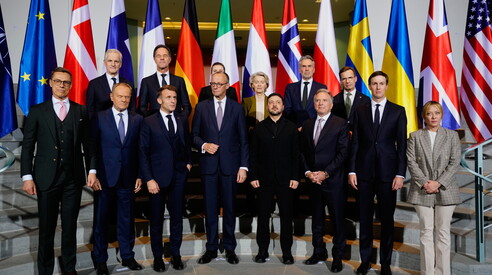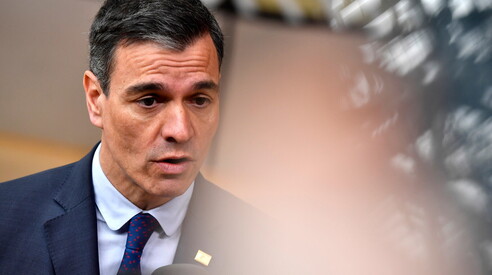
Alex Wong / Getty Images
interview
Alito: “Roe was a mistake that had to be corrected. That was what we did”
The Supreme Court's judge speaks on the first anniversary of his landmark decision on abortion in the U.S. The leak to the press was done to give someone “a rational reason to try to kill one of us”
Washington. For half a century, legal abortions have been practiced in America protected by an alleged constitutional right based on an erroneous interpretation of what "liberty" means. A gigantic national misunderstanding made possible by the historic Roe v. Wade ruling of 1973. “That was just wrong, it was egregiously wrong. The mistake had to be corrected. That was what we did,” says Justice Samuel Alito, one of the nine judges of the Supreme Court of the United States, the author a year ago of another sentence that will go down in history. With the Dobbs v. Jackson decision of June 24, 2022, approved 6-3 with the opinion for the majority written by Alito, Roe was canceled and with it the assumption that allowed about 600,000 to one million legal abortions a year, in the last 50 years, to take place under the protection of the Constitution. A sentence that is also having enormous political repercussions in America and that has changed the lives of the Supreme Court justices, who are under attack and delegitimized like never before. To the point of pushing Alito to make a heavy accusation in an interview with "Il Foglio": the leak to "Politico" of a draft copy of the decision, which last year preceded the publication of the sentence by six weeks, may have been made to give someone "a rational reason to try to kill one of those who were thought to be in the majority,” and so block the Dobbs case.
A few weeks ago, Alito told the "Wall Street Journal" that he and his colleagues had been made to become "targets of assassination". Now the justice explains and deepens that alarm, retraces the reasoning of the Dobbs sentence on its first anniversary and reflects about the debate in the country. “It’s been a unique and tumultuous year,” he explains. “There've been security problems, particularly in in the six weeks between the leak of the draft opinion in Dobbs and the day when the decision was announced.” That leak in May 2022 is in turn destined to go down in history, because it was the first time that from the austere and highly confidential building of the Court someone sent a complete copy of a provision not yet pronounced to the press. An internal investigation that lasted many months ended without identifying the person responsible. “During that period,” says Justice Alito, “someone who wanted to prevent the case from being decided the way they thought it was going to be decided, had a rational reason to try to kill one of those who were thought to be in the majority, because that would possibly change the outcome of the case.”
A leak wanted by someone who thought of instigating the murder, in order to stop the legal process of a sentence that completely changed the American approach to the issue of abortion. A hypothesis that is also based on a fact: at least in one case, in those six weeks there was someone who tried. “There was a man,” says Alito, “who apparently had that thought in mind when he went to Justice Kavanaugh's house with a gun and was planning to try to invade the house and kill Justice Kavanaugh and maybe members of his family. That was particularly bad.” The case Alito refers to took place on June 8, 2022, and featured 26-year-old Nicholas John Roske, who had flown from California to Maryland to kill Brett Kavanaugh, one of the three justices appointed to the Supreme Court by president Trump. Roske was arrested in front of Kavanaugh's home by federal agents who had just placed it under surveillance. With him he had a Glock-17 pistol, a combat knife, pepper spray and plastic ties to hold people down. “The security for all of the justices”, resumes Alito, “has been increased very substantially. That has imposed a huge burden and cost on our police force. We have our own police force that protects us as well as the US Marshals Service, which has been providing around the clock protection outside our homes. This has required an enormous expenditure of resources, and restrictions have on where we can go and where we can speak.”
This is because the incandescent climate in which the Washington judges have been immersed for a year is now added to the security measures. Justice Alito recounts a case that gives an idea of the situation, and which concerns only the conservative judges of the Court, not their progressive colleagues. “There are a lot of places,” he explains, “where some of us could not go and speak without being without producing a lot of disruptive protests. I gave a talk in May of last year, after the leak, for the Scalia Law School (named after Justice Antonin Scalia, Alito's famous colleague who died in 2016, ed.), previously known as the George Mason Law School, in Arlington, Virginia, right across the river from Washington DC. I had originally planned to go there and deliver the talk in person. But our police met with the college police and the Arlington police, and they said: ‘This is not a good idea for him to come here himself. The protests will be too severe. We don't think we can handle it’. So, I didn't go there in person. I spoke to the people who were there by Zoom. And even with that, the protests outside were so loud that the people who were in the law school building to hear this thing on Zoom were able to hear the protesters outside. That's what I think some of us can expect if we ever go to talk to at any college campus. Now maybe things will die down, but that's situation now.”
“In this year I was expecting a strong reaction,” reflects Alito, “but I can't say that I expected all the particulars that occurred. The Court has been attacked in ways that are unprecedented. There was an article in the ‘New York Times’ recently that made that point. It noted that presidents and members of the Congress used to speak very respectfully about our decisions. Even when they disagreed, they would say, ‘well, I disagree with the decision, but the Court has decided that case, and we have to abide by it’. What the article said was that now the situation is completely different from that, there are statements by members of Congress who suggest that we’re an illegitimate institution”. The article in question is an indictment especially for Democrats and it is significant that it came out in a newspaper that is certainly not tender towards the more conservative choices of the Court. A sign that a dangerous red line has been crossed. The "New York Times" recalled how in the recent past "Democrats were used to respectfully disagreeing with the judges." The most sensational example remains that of Al Gore, presidential candidate in 2000, who accepted without rebellion the Supreme Court decision that sent George W. Bush to the White House after the chaos of the votes in Florida, despite not agreeing at all with the conclusions of the justices. Now however, accuses the newspaper naming names of members of the House and the Senate, the Democrats have started to define the Court "illegitimate and corrupt, biased and extremist".
“This is not me speaking,” Alito says, “this is an article in the ‘New York Times’ that says these politicians, prominent politicians have said the Court is irredeemable. We're not going to talk about them the same way we did, in the same respectful tones. We're going to take them on. And there have been instances in which prominent members of Congress have said things like that.” A situation that is causing a collapse of trust in the Supreme Court: according to the latest Gallup poll, only 25% of Americans trust the justices, compared to 50% twenty years ago. The turning point was the Dobbs decision a year ago. “Roe was on a collision course with the Constitution from the day it was decided, Casey perpetuated its errors,” Alito wrote in the majority opinion for the sentence. A year later, he explains the conclusions by recalling the legal basis on which Roe was based: the 14th amendment to the Constitution, decided in 1868 to extend the rights of all Americans to former black slaves. “There's nothing in our Constitution that talks about the right to an abortion,” explains Alito. “It's an old Constitution. What they relied on was a provision adopted in 1868 that said that no person may be deprived of life, liberty, or property without due process of law. And they said, aha, there's the word “liberty”. And that word liberty includes the liberty to get an abortion. Well, that wasn't what that term was understood to mean in 1868. And if judges today can say ‘I know what liberty means. It means what I think liberty means, and that's what the Constitution requires and that's what all of the state legislatures in Congress have to abide by’, that is claiming an enormous amount of power based just on a one's personal idea of liberty.”
The question of liberty, for the judges of the Court who decided Dobbs, is complex and lends itself to dangerous misinterpretations. Alito explains: “Liberty is a very broad term. It means very different things to different people. To classical liberals, libertarians, it means the freedom to do pretty much whatever you want unless you harm other people. To socialists, it means something very different, it includes a degree of material equality that it gives a person, as a practical matter, the opportunity to do the sorts of things that people with more money, more affluent people can do. So, on the one hand, liberty means hands off, and on the other, case it means various social benefits, such as the right to certain wages, a free college education and so forth. You're claiming too much power for the judiciary if you say that the Constitution requires whatever a group of judges think liberty requires.” Here we reach the core of Roe and of the intellectual thought that in the U.S. has been dominant on abortion for half a century. Because thinking liberty like this, explains the judge, “was what Roe did, and it was a mistake from the start. The issue of abortion regulation should have been solved back then, in 1973. The country would have come to grips with it. The state legislatures were in the process at that time of enacting laws regulating abortion, and they would have continued with that if the Supreme Court had not stepped in.”
There was an alternative model, according to Alito, and it was the European one. “That's the way the issue's been handled in other countries. That's the way it's been handled almost everywhere in Europe. Parliaments have enacted laws regulating abortion, saying that abortion is allowed in certain circumstances but not in others." “Roe took all of that away from the legislators,” concludes Justice Alito, “and took it all upon the Court. And that was just wrong. It was egregiously wrong, as I wrote. So, the mistake had to be corrected. That was what we did.”





